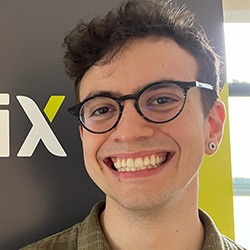Speaker Interview: Brian Schmatz, trinamiX

We would like to introduce our next interview of the series, featuring Brian Schmatz, Senior Manager of Business Development & Sales at trinamiX North America.
As Senior Manager of Business Development & Sales for trinamiX North America, they have led the launch of Mobile NIR Spectroscopy Solutions within the region and together with their team continue to find new opportunities for technology. The focus areas are within Plastics Recycling and Animal Nutrition, though the team has been building partnerships to create applications for Pharma, Agriculture, and Food Safety to name a few.
What are the biggest challenges facing the market today, and how can this be overcome?
Within Plastics Recycling, the biggest challenge is lack of trust throughout the general public. Technical progress on recycling infrastructure and recyclable packaging will mean very little if people do not trust the system enough to actually recycle
their plastic waste.
In my opinion, increased transparency can go a long way to overcoming this issue. Be open about what is and isn’t recyclable. Show that recycling is complex and messy, but that it works and can work better through innovation and buy-in. It is difficult
to build back trust once lost, but it is critical to the success of plastic waste diversion.
In your opinion, what do you consider to be the greatest development in your industry in the last decade?
Definitely the development of Mobile NIR Spectroscopy. But within Plastics Recycling, I would say the greatest development is an increase in support for reducing plastic waste that has led to greater acceptance of EPR legislation. These bills stimulate
innovation within this sector, and help to standardize the industry around methods that are many times already adopted by market leaders.
How do you see the sector developing in the next five to ten years?
I believe we will see more standardization around recycling infrastructure, especially for materials like flexibles which are not currently captured to a great degree. I am also excited to see further developments around decentralization of recycling through waste processing technology that is more flexible, modular, accessible, and/or mobile. These developments will increase the economic viability of recycling in non-metropolitan areas and developing regions.
You will be speaking at the AMI Plastics World Expos in North America, could you give us a preview on what you will be talking about?
One of the highlights of my role is engaging with the incredible people who make recycling work outside of traditional curbside programs, many of them our customers. This talk is about them; and how localized community programs that tackle plastic waste
are essential to the future of plastic recycling.
I will be highlighting some regional stories like marine plastics recycling in Alaska and fishing net recycling in the Puget Sound; and will also discuss the importance of accessible recycling technology in global regions with little to no recycling infrastructure.
Brian Schmatz will be speaking at the AMI Plastics World Expos in North America.
